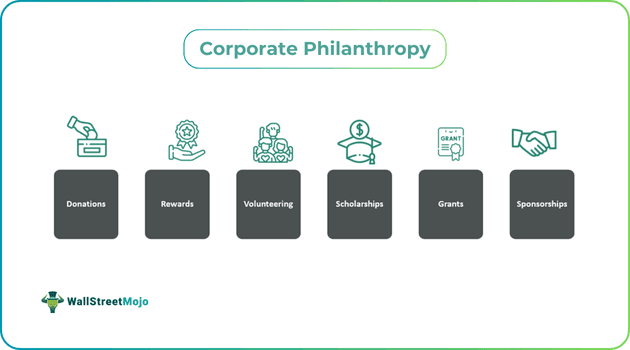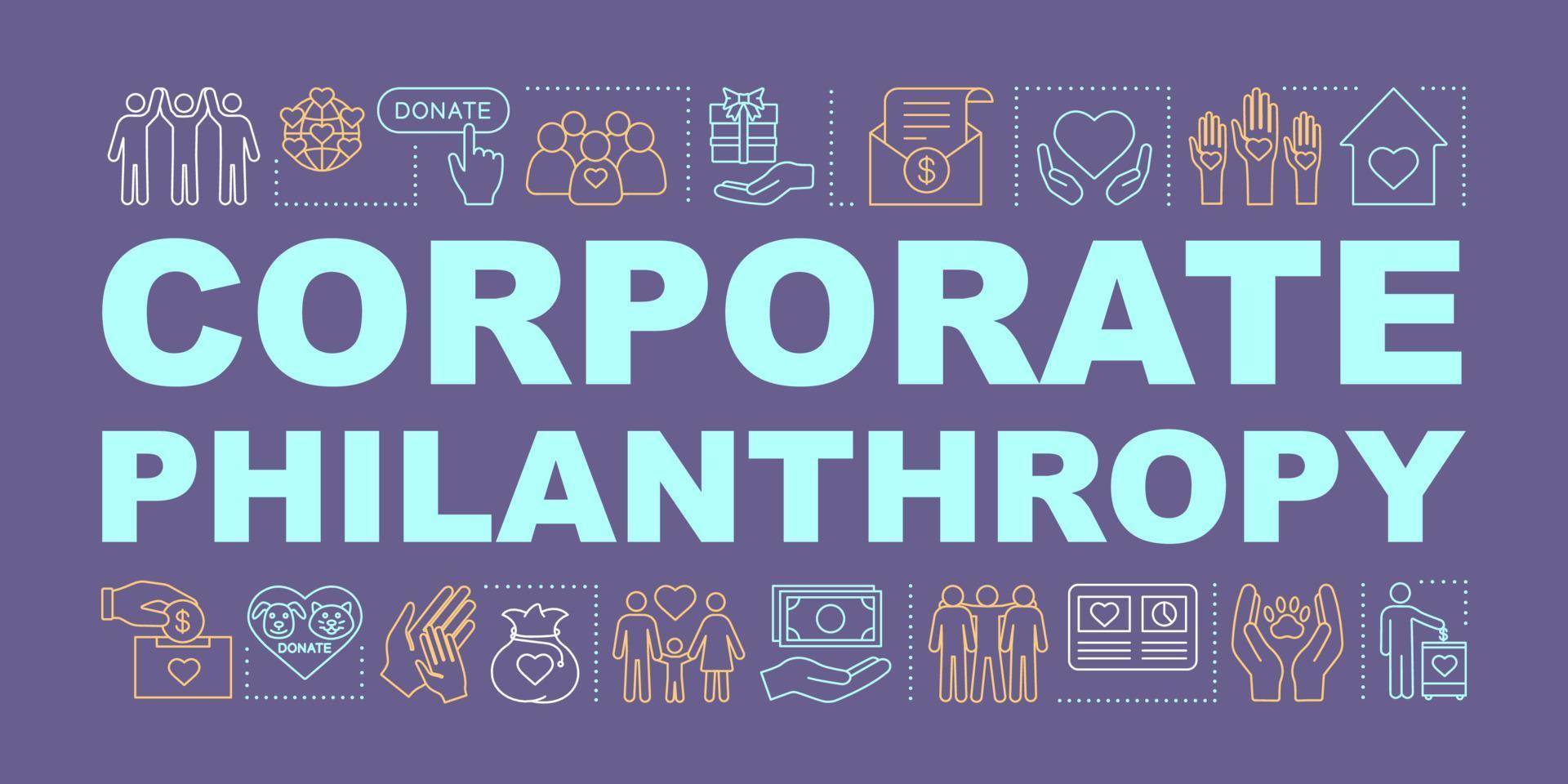The Role of Business Philanthropy in Fostering Sustainable Service Practices
Corporate philanthropy has actually emerged as an essential approach for services aiming to incorporate sustainability into their procedures. By aligning company purposes with social and environmental efforts, organizations can cultivate much healthier environments. This technique not only enhances business credibility however likewise reinforces stakeholder relationships. The true extent of its influence on long-lasting service success continues to be to be checked out. What ingenious methods are being adopted therefore?
Recognizing Company Philanthropy and Its Relevance
Business philanthropy serves as a vital mechanism where businesses can add to social well-being while improving their very own online reputations. This method includes organizations assigning sources, such as funds, time, or expertise, to support community campaigns, philanthropic causes, or social programs. By participating in philanthropic initiatives, companies can resolve pressing social concerns, such as education, health care, and ecological problems, consequently playing an essential role in fostering favorable change.
Moreover, company philanthropy can enhance employee morale and draw in talent, as individuals progressively seek to help socially accountable companies. It can likewise strengthen client loyalty, as consumers favor brand names that show a dedication to making a difference. Inevitably, comprehending the relevance of corporate philanthropy lies in acknowledging its twin advantages: improving neighborhood welfare while all at once boosting company trustworthiness and trustworthiness in the eyes of stakeholders. This placement of social obligation with business rate of interests underscores its significance in today's business landscape.
The Link Between Corporate Philanthropy and Sustainability
While several firms involve in philanthropy to improve their public image, a much deeper connection exists in between business philanthropy and sustainability. Company philanthropy commonly straightens with sustainable techniques by supporting initiatives that resolve environmental and social difficulties. They contribute to a healthier environment and culture when organizations invest in neighborhood tasks, renewable power, or academic programs. This commitment not just promotes goodwill however also enhances stakeholder relationships, boosting brand name loyalty.

Case Researches: Effective Corporate Philanthropy Initiatives
Numerous firms have efficiently incorporated humanitarian campaigns right into their company approaches, demonstrating the tangible benefits of such dedications. As an example, Microsoft has launched numerous programs, such as its AI for Earth initiative, which sustains ecological sustainability with modern technology. This strategy not just aids conservation efforts however additionally boosts Microsoft's reputation as a leader in company obligation.
Unilever's Lasting Living Plan stresses social and environmental impact, straightening its philanthropy with organization goals. By moneying projects that boost hygiene and cleanliness, Unilever strengthens its brand name while adding to worldwide health.
An additional significant example is Patagonia, which pledges 1% of sales to environmental reasons. This dedication reverberates with customers, fostering loyalty and driving sales.
These case researches highlight that effective corporate philanthropy can produce financial returns while promoting lasting visit the website practices, enhancing the concept that ethical company practices are useful for both culture and profits.
Structure Stronger Stakeholder Relationships Via Philanthropy
Philanthropy works as a necessary tool for companies seeking to strengthen their partnerships with stakeholders, as it promotes trust and demonstrates a dedication to social responsibility. By involving in philanthropic initiatives, organizations can attach with local communities, enhancing their online reputation and encouraging stakeholder loyalty. This interaction typically brings about meaningful interactions, producing a sense of shared values in between the company and its stakeholders.
In addition, humanitarian initiatives can attend to certain community needs, enabling companies to contribute favorably to social difficulties. This involvement not just showcases a business's moral stance but additionally assists in attracting and keeping clients who prioritize social responsibility.
Furthermore, staff members often really feel much more determined and engaged when they see their company proactively joining humanitarian activities, resulting in an extra efficient office society. Business philanthropy becomes a strategic method for building more powerful, a lot more durable partnerships with varied stakeholder teams.
Gauging the Influence of Company Philanthropy on Company Success
The connection between business philanthropy and stakeholder interaction establishes the stage for evaluating its influence on overall service success. Organizations frequently determine this influence with different metrics, including brand reputation, employee contentment, and customer loyalty. Philanthropic initiatives can boost a company's photo, promoting count on among consumers and financiers alike. Involved workers often tend to exhibit greater morale and performance, straight associating to boosted business efficiency.
Quantitative evaluation can likewise be employed, with organizations examining economic returns against kind expenditures. Study suggests that companies with strong kind commitments typically experience higher stock performance and reduced volatility. Additionally, qualitative evaluations, such as stakeholder responses, can offer insights right into community assumptions and long-lasting relational advantages.
Inevitably, measuring the effect of corporate philanthropy requires a complex method, integrating both qualitative and measurable data to guarantee a complete understanding of its impact on company success. corporate philanthropy.
Frequently Asked Inquiries
How Can Small Organizations Participate In Corporate Philanthropy Properly?

What Are Common False Impressions About Corporate Philanthropy?

Exactly How Does Company Philanthropy Impact Worker Morale?
Business philanthropy favorably affects employee spirits by fostering a feeling of objective, enhancing work satisfaction, and promoting commitment. Workers commonly feel a lot more involved and inspired when their business adds to social reasons, creating a helpful workplace.
What Are the Tax Obligation Advantages of Corporate Philanthropy for Companies?
Company philanthropy uses substantial tax benefits for services, including reductions on charitable payments and potential reductions in taxable income. These incentives encourage firms to take part in social initiatives while concurrently boosting their economic click for info standing.
Just How Can Companies Select Efficient Philanthropic Partners?
Companies can pick effective kind companions by examining alignment with their worths, evaluating effect capacity, taking a look at economic transparency, and promoting solid interaction. This strategic method enhances cooperation and assurances shared benefits for both events entailed.
Corporate philanthropy offers as a crucial device through which organizations can add to social well-being while enhancing their own online reputations - corporate philanthropy. Eventually, recognizing the importance of company philanthropy exists in identifying its double benefits: find this enhancing community well-being while at the same time boosting service credibility and credibility in the eyes of stakeholders. While lots of companies involve in philanthropy to boost their public image, a deeper link exists between corporate philanthropy and sustainability. The link in between business philanthropy and stakeholder interaction establishes the stage for reviewing its impact on total business success. Business philanthropy provides significant tax obligation advantages for companies, including reductions on charitable payments and potential reductions in taxable revenue